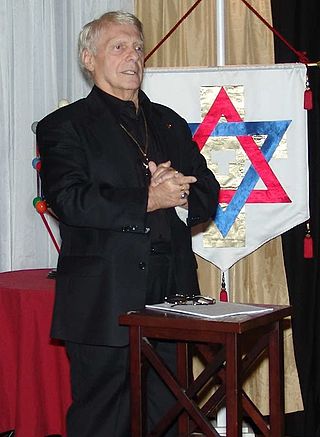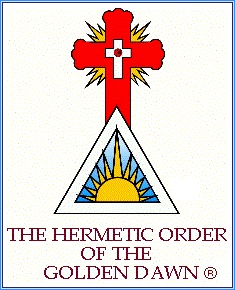
The Hermetic Order of the Golden Dawn, more commonly the Golden Dawn, was a secret society devoted to the study and practice of occult Hermeticism and metaphysics during the late 19th and early 20th centuries. Known as a magical order, the Hermetic Order of the Golden Dawn was active in Great Britain and focused its practices on theurgy and spiritual development. Many present-day concepts of ritual and magic that are at the centre of contemporary traditions, such as Wicca and Thelema, were inspired by the Golden Dawn, which became one of the largest single influences on 20th-century Western occultism.

Liber AL vel Legis, commonly known as The Book of the Law, is the central sacred text of Thelema. Aleister Crowley said that it was dictated to him by a beyond-human being who called himself 'Aiwass'. Rose Edith Kelly, Crowley's wife, wrote two phrases in the manuscript. The three chapters of the book are spoken by the deities Nuit, Hadit, and Ra-Hoor-Khuit.

Francis Israel Regardie was a British-American occultist, ceremonial magician, and writer who spent much of his life in the United States. He wrote fifteen books on the subject of occultism.

Tattva vision is a technique developed by the Hermetic Order of the Golden Dawn to aid with the development of the faculty of astral clairvoyance. They were derived from the elements or tattvas of Hindu philosophy and the Vedantic doctrine of pancikarana, as interpreted by the Golden Dawn.

Binah is the third sephira on the kabbalistic Tree of Life. It sits on the level below Keter, across from Chokhmah and directly above Gevurah. It is usually given four paths: from Keter, Chokhmah, to Gevurah and Tiphereth.

A lamen is a magical pendant or breastplate worn around the neck so that it hangs upon the breast over the heart. Its uses vary but, most commonly, the term refers to a symbol of authority and a focus of magical energies. Aleister Crowley described the lamen as "a sort of coat of arms. It expresses the character and powers of the wearer." Crowley and DuQuette have proposed that the magical lamen might be a modern adaptation of the priestly breastplate of the ancient Hebrews.

Christopher Hyatt, born Alan Ronald Miller, was an American psychologist, occultist, and writer. He is perhaps best known as president of New Falcon Publications, an independent publisher specializing in of psychedelic and occult literature; Hyatt's press published work by several well-known champions of consciousness expansion, including Israel Regardie, Timothy Leary, Robert Anton Wilson, and Antero Alli.
The tree of life is a diagram used in Rabbinical Judaism in kabbalah and other mystical traditions derived from it. It is usually referred to as the "kabbalistic tree of life" to distinguish it from the tree of life that appears alongside the tree of the knowledge of good and evil in the Genesis creation narrative and well as the archetypal tree of life found in many cultures.
Aiwass is the name given to a voice that the English occultist and ceremonial magician Aleister Crowley reported to have heard on April 8, 9, and 10 in 1904. Crowley reported that this voice, which he considered originated with a non-corporeal being, dictated a text known as The Book of the Law or Liber AL vel Legis to him during his honeymoon in Cairo.
Aleister Crowley was a highly prolific English writer, not only on the topic of Thelema and magick, but on philosophy, politics, and culture. He was also a published poet and playwright and left behind many personal letters and daily journal entries. Most of Aleister Crowley's published works entered the public domain in 2018.

Magick Without Tears, a series of letters, was the last book written by English occultist Aleister Crowley (1875–1947), although it was not published until after his death. It was written in 1943 and published in 1954 with a foreword by its editor, Karl Germer.

The Law is for All is a collection of Aleister Crowley's commentary on The Book of the Law, the central sacred text of Thelema. It was edited to be a primer of sorts into Crowley's general interpretations about the sometimes opaque text of Liber Legis. For this reason, the book omits many of the more complex qabalistic explanations that lean heavily on an understanding of gematria and The Tree of Life. As the original editor, Louis Wilkinson, wrote in his introduction (p. 17):
The aim of the Commentary on the Book of the Law is to guide the reader along the path of the discovery of his own true will, in accordance with which, and only in accordance with which, he can rightly think and act. This is why "Do what thou wilt shall be the whole of the Law." Only by doing so will you be shown your own true thought and life.
In ceremonial magic, banishing refers to one or more rituals intended to remove non-physical influences ranging from spirits to negative influences. Although banishing rituals are often used as components of more complex ceremonies, they can also be performed by themselves. Banishing can be viewed as one of several techniques of magic, closely related to ritual purification and a typical prerequisite for consecration and invocation.

The Lesser Ritual of the Pentagram is a ceremonial magic ritual devised and used by the original order of the Golden Dawn that has become a mainstay in modern occultism. This ritual is considered by many to be a basic preliminary to any other magical work, so much that it was the only ritual, besides initiation rituals, taught to members of the Golden Dawn before they advanced to the Inner Order.

The Alpha et Omega was an occult order, initially named the Hermetic Order of the Golden Dawn, co-founded in London, England by Samuel Liddell MacGregor Mathers in 1888. The Alpha et Omega was one of four daughter organisations into which the Hermetic Order of the Golden Dawn fragmented, the others being the Stella Matutina; the Isis-Urania Temple led by A. E. Waite and others; and Aleister Crowley's A∴A∴. Following a rebellion of adepts in London and an ensuing public scandal which brought the name of the Golden Dawn into disrepute, Mathers renamed the branch of the Golden Dawn remaining loyal to his leadership to "Alpha et Omega" sometime between 1903 and 1913. "The title was usually abbreviated as A.O." and according to some sources its full name was "Rosicrucian Order of Alpha et Omega". All of the temples of the order appear to have gone out of existence by the Second World War.
Magical mottoes are the magical nicknames, pen names, or pseudonyms taken by individuals in a number of magical organizations. These members were known and sometimes referred to in many publications by these mottoes. Members of these organizations typically adopted such a motto at their initiation into the neophyte grade of the organizations.

Charles "Chic" Cicero is an American esoteric writer. He was born in Buffalo, New York. He has been a practicing ceremonial magician for the past forty years.
Sandra Tabatha Cicero is an American esoteric writer and lecturer, best known for her work in the field of Hermeticism.

Hermetic Qabalah is a Western esoteric tradition involving mysticism and the occult. It is the underlying philosophy and framework for magical societies such as the Golden Dawn, has inspired esoteric Masonic organizations such as the Societas Rosicruciana in Anglia, is a key element within the Thelemic orders, and is important to mystical-religious societies such as the Builders of the Adytum and the Fellowship of the Rosy Cross.

The Hermetic Order of the Golden Dawn, Inc. is a 501(c) non-profit organization associated with a modern magical Order of the same name. While bearing the same name as the historical Hermetic Order of the Golden Dawn (1888–1908), the modern Order does not have direct descent or institutional lineage from the original Order or from the S.R.I.A.













